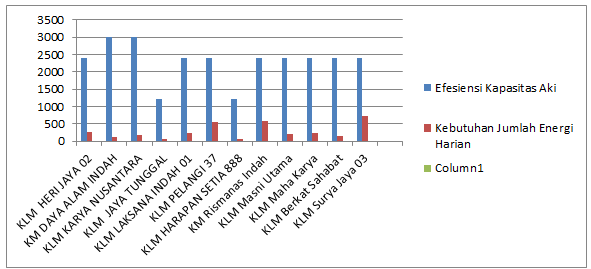Analysis Of The Efficiency Of Using Solar Cells In The Electrical System Of Non-Conventional Ship
Main Article Content
Abstract
This research aims to determine the efficiency of using solar cells in non-conventional ship electrical systems. The method that will be used in the research is the use of primary data and secondary data which will provide a comprehensive approach in this research. Based on the analysis above, a system with solar cells can produce Wh of energy per day, to meet daily energy needs with Wh of the Watts used every day. By using the battery capacity, the system has very large energy reserves, allowing the system to be used every day and will be very efficient in meeting load needs, with excess energy capacity. With a generator capacity with more than enough Wattage to meet the daily energy needs of the existing load, this means there is excess energy that can be stored in the generator.
Downloads
Article Details

This work is licensed under a Creative Commons Attribution 4.0 International License.
Allow anyone to modify, improve, and make derivative works, even for commercial purposes, as long as they credit to you for the original work.
References
[1] Adelia, AZ (2017). Design of Solar Cell for Electrical Energy Needs on Fishing Boats. Unitek Journal, 10(1), 1-7. https://doi.org/10.52072/unitek.v10i1.66
[2] Directorate General of Electricity. 2011. International Electrotechnical Commission (PUIL). General Requirements for Electrical Installations, IEEE, SPLN and so on.
[3] Dzulfikar, D,. & Wisnu, B. (2016). Optimization of Household Solar Power Utilization. National Physics Seminar 2016 UNJ. https://doi.org/10.21009/0305020614
[4] European Maritime Safety Agency. 2020. Electrical Energy Storages for Ships. DNV GL AS Maritime Environment Advisory Veritasveien 1 1363. Hovik Norway.
[5] Hasrul, R. (2021). Analysis of Solar Panel Efficiency as Alternative Energy. SainETIn (Journal of Science, Energy, Technology & Industry), 5 (2), 79-87. https://doi.org/10.31849/sainetin.v5i2.7024
[6] Julianto, TS (2019). Phytochemistry Review of Secondary Metabolites and Phytochemical Screening. Yogyakarta. Islamic University of Indonesia.
[7] [Ministry of Transportation of the Republic of Indonesia] Ministry of Transportation of the Republic of Indonesia. 2009. Decree of the Minister of Transportation of the Republic of Indonesia Number KM 65 of 2OO9 concerning the Standard of Non-Convention Vessels (Non Convention Vessel Standard) Flying the Indonesian Flag. Jakarta: Ministry of Transportation of the Republic of Indonesia.
[8] [KESDM RI] Ministry of Energy and Mineral Resources of the Republic of Indonesia. (2029). Decree of the Minister of Energy and Mineral Resources of the Republic of Indonesia Number 2 of 2020. Concerning Solar Energy. Jakarta: KESDM RI.
[9] Purwoto, BH, et al. (2018).” Efficiency of Solar Panel Usage as an Alternative Energy Source”. Emitter: Journal of Electrical Engineering, 18 (1), 10-14. https://doi.org/10.23917/emitor.v18i01.6251
[10] Raihan, A. (2023), Effectiveness of Implementation of Non Convention Vessel Standard (NCVS) based on the Regulation of the Minister of Transportation KM.65/2009 concerning Standards for Non Convention Vessels Flying the Indonesian Flag. Jaksa: Journal of Legal and Political Studies, 1(4),11-12. https://doi.org/10.51903/jaksa.v1i4.1395
[11] Ramanan, C.J., et al. (2024). Towards Sustainable Power Generation: Recent Advancements In Floating Photovoltaic Technologies. Renewable and Sustainable Energy Reviews, 194, 114322. https://doi.org/10.1016/j.rser.2024.114322.

